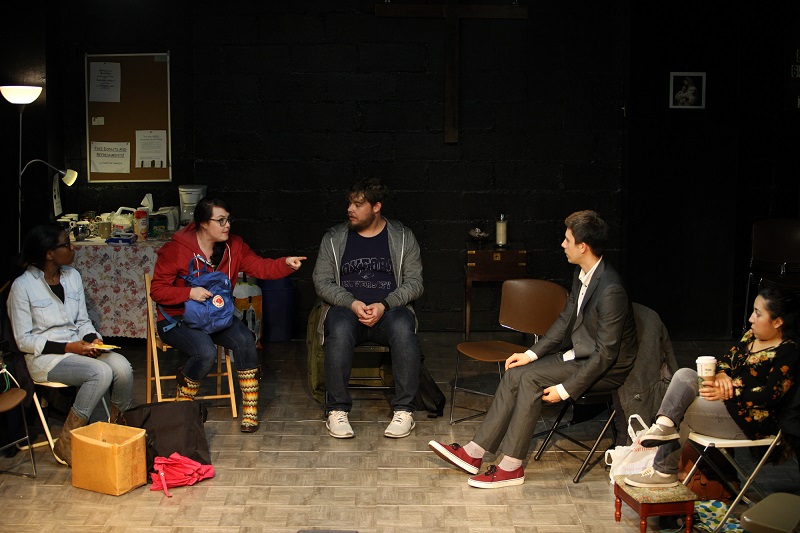
Max Baker's new play, The Conspiracists, happens to be making its debut alongside widespread media coverage of the custody trial of toxic conspiracy monger Alex Jones, during which a lawyer for Jones argued that his on-air persona is merely performance art (a claim later disputed by his on-air persona). Many took this defense as a clear admission that he knowingly spreads lies for profit, but at least one writer has claimed that performing a character does not necessarily mean that the performer does not believe what the character delivers. That observation could apply equally well to the array of avowed believers who assemble as a support group in Baker's latest effort. In fact, one character, Hilda (Lisa Jill Anderson), posits, to the displeasure of the others, that belief in conspiracy theories is a self-protective measure masking feelings of powerlessness. That she may be objectively correct is not meant to demean these characters or to diminish the complexity of their lived experience, a point that is underscored by the fact that Hilda herself behaves not a sage dispenser of wisdom so much as a cheerfully, obliviously condescending outsider to the group, as absorbed in her own faintly silly interests as the conspiracists are in theirs.
The Conspiracists displays the same rich, deeply human portrayal of knotty interpersonal dynamics as Baker's previous two plays with Stable Cable Lab Co., Live from the Surface of the Moon and Because Me, and it picks up to some degree the former's concern with issues of memory and the latter's with the search for purpose. The play takes place in a typical church basement, with its large cross, table with plastic tablecloth and coffee maker, and array of mismatched folding chairs lit by the harsh glare of overhead fluorescents. Here, Win (Ian Poake) acts as the de facto leader of a weekly support group for believers in conspiracy theories. Brooke (Alice Johnson), outwardly a hippie; Dee Dee (Sofiya Cheyenne), on the lookout for perceived slights; Emmett (Arthur Kriklivy), self-positioned as the deep-thinking intellectual; and Jo (Ricki Lynée), quietly awkward and focused but likably friendly, round out the regulars. Each member has particular beliefs, and it quickly becomes apparent that even here, in a space dedicated to acceptance of alternatives, most of the group members don't hesitate to dismiss positions that don't agree with their own, despite the group's foundational opposition to the "mainstream" doing exactly that. We also glimpse the foundations of truths on which conspiracy theories are erected, such as that the United States government habitually lies to its citizens, which is a matter of historical record. Again, these characters are performing a version of what everyone does in order to create his or her own worldview. They are less different from the mainstream than they (or we) like to think in other ways as well, which becomes apparent as we learn more about them, from their resentment of Win's attempts at management to their lives outside the group.
Complicating this trajectory, however, is the instability of to whom we are referring when we say "the characters." The Conspiracists radically departs in its structure from the two Baker plays mentioned above, employing what might be called repetition with a difference. Jo is conducting experiments related to parallel universes, and the play takes that concept as its organizing principle. At one point, Emmett explains the theory that all of history comprises repeating three-part cycles of awakening, unraveling, and crisis, each part associated with a certain figure: the Nomad, the Hero, and the Artist, respectively. That the play too falls in a three-part cycle may or may not be coincidental. The structure includes clever interlocking elements among the parts, some more and some less subtle and some more and some less thematic. The play also takes place on Tuesday, November 1, 2016, one week before the presidential election, a moment which it is easy, though perhaps disheartening, to imagine as a point of divergence for an alternate version of this universe. This framing structure fits neatly with the consideration of alternative truths raised not only by the characters' embrace of conspiracy but also by moments such as Steve (Lisa Jill Anderson)'s assertion that memories often "feel more real than what actually happened" and Hilda's that feelings are themselves a type of truth. She is, again, a bit obnoxious about it, but not inaccurate, and the play cycles back with the results of Jo's final experiment to questions of how, with varying degrees of awareness, we mold our own perceptions.
Lisa Jill Anderson gets the flashiest role, excelling as the unstable Madonna, Camus-invoking Steve, and bubbly Hilda. The rest of the cast, however, make equally distinctive and funny showings. Ian Poake's Win is winningly affable, until things don't go how he has decided they should; Arthur Kriklivy creates a reserved yet layered Emmett, and Sofiya Cheyenne's exchanges with him as the brash Dee Dee provide some of the play's funniest moments. Alice Johnson rises to the occasion when Brooke's facade of cutesy euphemisms and tote bags finally breaks down, and Ricki Lynée's subtle, expressive performance brings impressive clarity to a character who spends a lot of the play not speaking.
Could there be a parallel universe in which parallel universes did not exist? While Emmett might find such a query intriguing, it is not the kind of question that The Conspiracists is interested in. Its speculative elements are always firmly in service of its characters, to their and the audience's great benefit. It is lucky that ours is a universe in which we can look forward to a new Max Baker play. - Leah Richards & John Ziegler
